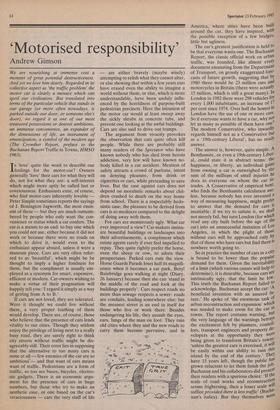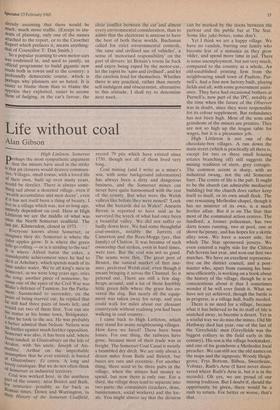`Motorised responsibility'
Andrew Gimson
We are nourishing at immense cost a monster of great potential destructiveness. And yet we love him dearly. Regarded in its collective aspect as 'the traffic problem' the motor car is clearly a menace which can spoil our civilisation. But translated into terms of the particular vehicle that stands in our garage (or more often nowadays, is parked outside our door, or someone else's door), we regard it as one of our most treasured possessions or dearest ambitions, an immense convenience, an expander of the dimensions of life, an instrument of emancipation, a symbol of the modern age (The Crowther Report, preface to the Buchanan Report Traffic in Towns, HMSO 1963).
Is 'love' quite the word to describe our feelings for the motor-car? Owners generally 'love' their cars for what they will do, not for what they are: a self-interest which might more aptly be called lust or covetousness. Enthusiasts exist, of course, who find motor-cars inherently lovable Peter Simple sometimes reports the sayings of J. Bonington Jagworth, the most emin- ent of these — but they are much outnum- bered by people who only want the con- venience or status which a car confers. The car is a means to an end: to buy one which you could not use, either because it did not work or because there were no roads on which to drive it, would even to the enthusiast appear absurd, unless it were a museum piece. Cars are very often refer- red to as 'beautiful', which might be be thought to imply a higher fondness for them, but the compliment is usually em- ployed as a synonym for smart, expensive, efficient or modern. Car-owners wishing to make a virtue of their pragmatism will happily tell you: 'I regard it simply as a way of getting from A to B.'
If cars are not loved, they are tolerated. Were it thought we could live without them, a very proper loathing of them would develop. There are, of course, those who believe that the presence of cars lends vitality to our cities. Though they seldom enjoy the privilege of living next to a really busy road, they are surely right to think city streets without traffic might be dis- agreeably still. Their error lies in supposing that the alternative to too many cars is none at all — few enemies of the car are so ambitious'— and that want of cars means want of traffic. Pedestrians are a form of traffic, so too are buses, bicycles, electro- nic gadgets. There is an economic argu- ment for the presence of cars in huge numbers, but those who try to make an aesthetic case, or one based on the car's vivaciousness — cars the very stuff of life — are either bravely (maybe wisely) attempting to relish what they cannot alter, or else showing that within a few years cars have erased even the ability to imagine a world without them, or else, which is more understandable, have been unduly influ- enced by the horridness of purpose-built pedestrian precincts. Here the intrusion of the motor car would at least sweep away the sickly shrubs in concrete tubs, and prevent one looking at the awful buildings. Cars are also said to drive out tramps.
The argument from vivacity provokes the observation that cars quite often kill people. While there are probably still many readers of the Spectator who have known nobody who has died from heroin addiction, very few will have known no- body killed in a car accident. Mention of safety attracts a crowd of puritans, intent on denying pleasure, from drink or cigarettes or cars, while pretending to save lives. But the case against cars does not depend on moralistic remarks about chil- dren crushed to death on the way home from school. There is a respectably hedo- nistic case; the pleasure to be derived from cars is so mediocre compared to the delight of doing away with them.
For cars are monstrously ugly. What car ever improved a view? Car-makers insinu- ate beautiful buildings or landscapes into their advertisements, a compliment which estate agents rarely if ever feel impelled to repay. They quite rightly prefer the horse, even the sheep or cow, to adorn their prospectuses. Parked cars ruin the view. Horse Guards Parade loses half its magnifi- cence when it becomes a car park, Beryl Bainbridge goes walking at night (Diary, 26 January) because then she can 'stand in the middle of the road and look at the buildings properly'. Cars respect roads no more than sewage respects a sewer: roads are conduits, leading somewhere else: but the meanest street is an end in itself for those who live or work there. Besides endangering his life, they assault the eyes, ears, lungs of the man on foot. They ruin old cities where they and the new roads to carry them become pervasive, and in America, where cities have been built around the car, they have inspired, with the possible exception of a few bridges, little but ugliness.
The car's greatest justification is held to be that everyone wants one. The Buchanan Report, the classic official work on urban traffic, was founded, like almost every document emanating from the Department of Transport, on grossly exaggerated fore- casts of future growth, suggesting that by 1980 there would be 23 million cars and motorcycles in Britain (there were actually 15 million, which is still a great many). In London in 1982 there were 298 vehicles for every 1,000 inhabitants, an increase of 17 per cent since 1974. Over half the homes in London have the use of one or more ears' So if everyone wants to have a car, why not let as many as possible of them have one. The modem Conservative, who inwardly regards himself not as a Conservative but as a '19th-century Liberal', has no ready answer.
The answer is, however, quite simple. A Benthamite, or even a 19th-century Liber- al, could state it in abstract terms: the happiness, or liberty, an individual gains from owning a car is outweighed by the sum of the milliops of small injuries he does to everyone on whom the car in- trudes. A Conservative of empirical bent, who finds the Benthamite calculation use- less, because nobody has ever invented a way of measuring happiness, might prefer to answer that the demand for cars is insatiable: if we try to satiate it, we shall not merely fail, but turn London (for which read any city built before the age of the car) into an unsuccessful imitation of 11,°5 Angeles, in which the plight of those without cars will be approached only by that of those who have cars but find there is nowhere worth going to. So in practice the number of cars in a citY is bound to be lower than the popular demand for them. Given the inevitability of a limit (which various causes will help to determine), it is desirable, because cars are intrinsically ugly, that the limit be low. This truth the Buchanan Report failed to acknowledge. Buchanan accept the car: 'A beneficial invention with an assured fit; ture.' He spoke of 'the enormous task of urban reconstruction and expansion' which was needed to make room for the car in towns. The report contains warning, but the very language of the warnings betrays the excitement felt by planners, council- lors, transport engineers and property de- velopers at the opportunity they were being given to transform Britain's towns: `unless the greatest care is exercised, it will be easily within our ability to ruin this island by the end of the century.' They have 15 years left, though the public has grown reluctant to let them finish the job. Buchanan and his collaborators did present their readers with a spurious choice: `If the scale of road works and reconstruction. seems frightening, then a lesser scale will suffice provided there is less traffic' (Bucha' nan's italics). But they themselves were
already assuming that there would be much, much more traffic. (Except to stu- dents of planning, only one of the names attached to the report, or to the Crowther Report which prefaces it, means anything: that of Councillor T. Dan Smith.) So a popular yearning to own motor-cars was enshrined in, and used to justify, an official programme to build gigantic new roads both in towns and in the country: a Profoundly democratic course, which is Perhaps why planners are so hated. It is easier to blame them than to blame the appetite they exploited, easier to accuse them of fudging, in the car's favour, the clear conflict between the car and almost every environmental consideration, than to admit that the electorate is anxious to have the best of both these worlds. Buchanan called for strict environmental controls, 'the sane and civilised use of vehicles', a sense of 'motorised responsibility' on the part of drivers: let Britain's towns lie back and enjoy being raped by the motor-car, let the rapist be 'sane and civilised', and let the careless fend for themselves. Whether there is any practical, rather than merely self-indulgent and obscurantist, alternative to this attitude, I shall try to determine next week.











































 Previous page
Previous page